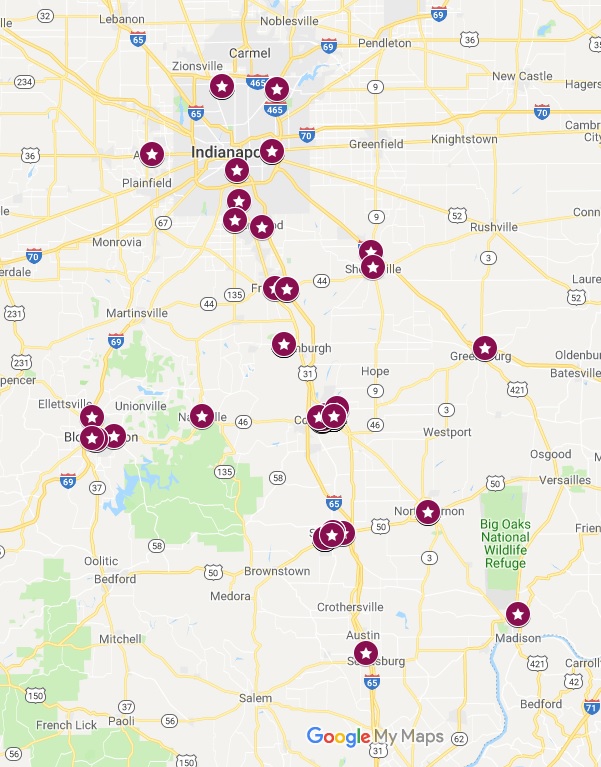In addition to classroom based and online learning, our graduate students have extensive hands-on experiences through laboratory-based simulations, community-based service learning projects, and clinical field experiences. These learning experiences, described below, change with time and may be different for future students.
Hands-on learning experiences
First-semester MHC students apply newly learned skills with unfamiliar people through recorded role-plays with undergraduate psychology students. In teams, our students also teach stress management techniques to classes of first-year undergraduate students. The semester concludes in the IU Columbus Simulation Center where students conduct an intake with a trained actor portraying a standardized patient.
Second-semester students work with “real clients” and other professionals in training. Past graduate students have provided career assessment and advising services to area high schools. Our MHC students also collaborate on simulated cases with trainees from other health care professions (e.g., nursing, medicine, etc.). These simulated and service-learning activities prepare our students for their practicum experience in the Fall of their second year.
During practicum and two subsequent internships, students apply skills and gain clinical experience at both community- and campus-based sites. The Tom & Barbara Schoellkopf Community Counseling Center is a training clinic located on the IU Columbus campus. This versatile space was designed to support the instructional, service, and research activities of the graduate mental health counseling program and undergraduate psychology programs. The space includes a reception area, seminar and supervision room, a group process room, individual counseling room, a child / couple / family therapy room, and an office for a center supervisor. Each room is equipped with one or two high definition video cameras and a high gain microphone recording to a HIPAA compliant digital recording system. An audio talkback system in each room also allows university faculty to provide feedback discretely and securely to students conducting therapeutic or research protocols. Mobile and flexible furnishings accommodate a wide variety of data collection, assessment, and treatment activities for children, adolescents, and adults. The Tom & Barbara Schoellkopf Community Counseling Center makes it possible for graduate students in our program to receive feedback on their counseling skills in real time and to provide much needed services to fellow students and community members.
Starting with the fourth semester and continuing through the remainder of the program, students participate in 700 clock hours of formal field experience overseen by faculty and clinical site supervisors. Since 2013, some 35 clinical sites have hosted 42 trainees for practicum, internship, or advanced internship. These include private practices, intensive outpatient programs, in-patient hospitals, schools, and other settings. Students are encouraged to explore clinical interests during graduate school (e.g., different settings, practice areas, and populations) while also developing a marketable area of focus.
Below is a snapshot of field experience sites where past graduate students in the program have participated in practica or internships.

Faculty provide information about possible field experience sites, which students use to obtain their individual field experiences. This process develops valuable job search skills that students use upon graduation to find full-time employment. About 50% of our alumni work as a paid professional at their field experience site after graduation.
During their penultimate semester, students are prepared for eventual leadership roles in service delivery organizations through applied consultation projects with community organizations. These team-based projects help students learn the differences between counseling and consulting relationships and the systemic factors that influence service delivery. Example projects include authoring learning activities for use by health educators teaching suicide risk assessment and describing the essential components of in-patient substance abuse treatment for a non-profit organization.



